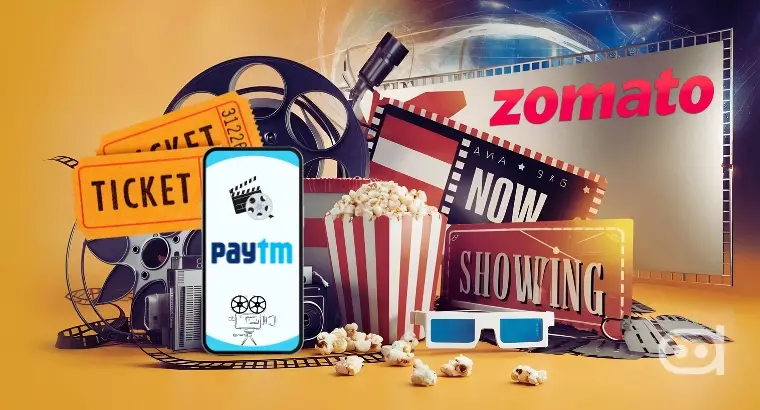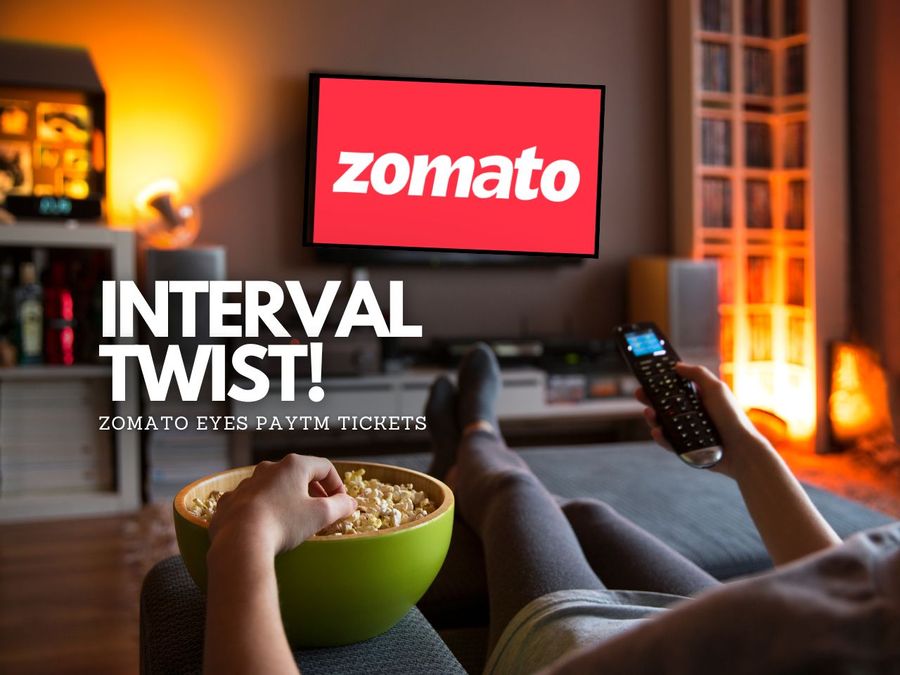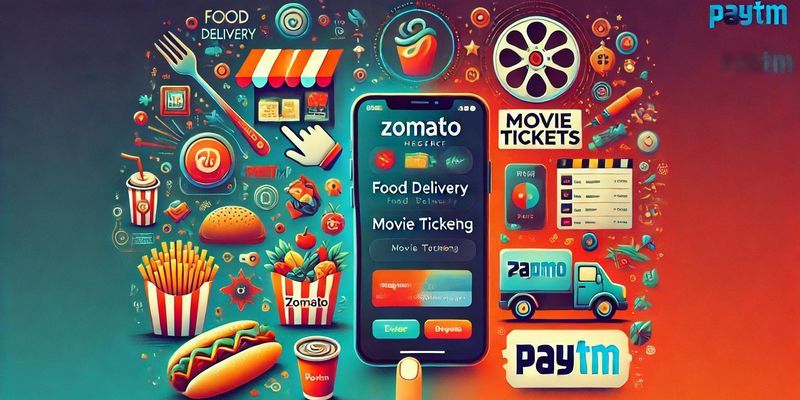Zomato Seals The Deal, Will Acquire Paytm’s Movie Ticketing, Events Biz For Rs. 2048; What Are The Challenges On The Path Of Zomato And Is The Acquisition A Wise Move?
Zomato in order to diversify its business portfolio and in a proactive move has announced the acquisition of Paytm's movie ticketing and events division in an all-cash deal worth Rs 2,048 crore. The acquisition will mark a significant step for Zomato as it seeks to strengthen its position in the entertainment sector, building on its already strong presence in food delivery and quick commerce. However, is Zomato's Acquisition of Paytm's Movie Ticketing Business a Wise Move?

Zomato, in an expansion mode beyond food delivery, and is set to acquire Paytm’s movie ticketing and events division in an all-cash deal valued at Rs 2,048 crore.
The acquisition, which was confirmed by both companies in filings with the stock exchanges on Thursday, marks a considerable step in Zomato’s diversification strategy.
One 97 Communications Ltd, the parent company of Noida-based online payments Paytm, currently manages the movie ticketing and events business through its subsidiaries, Orbgen Technologies and Wasteland Entertainment, which run TicketNew and Insider, respectively.
As part of the deal, these subsidiaries, along with approximately 280 employees, will be transferred to Zomato.

Zomato’s Move
The acquisition is in line with Zomato’s ongoing efforts to bulk up its “going-out” business, which includes dining out, live events, and movie ticketing.
The move comes on the heels of Zomato’s aggressive investments in quick commerce, most notably with the acquisition of Blinkit in 2022, as the company looks to create additional pillars of growth amidst a plateauing food delivery market.
Notably, Zomato’s Rs 12,539 crore cash reserve has enabled it to pursue this inorganic growth strategy.
The company recently announced the upcoming launch of a new app called “District,” which will focus on the going-out business. This app is expected to become Zomato’s third major business-to-consumer vertical after food delivery and quick commerce.
The transfer of the entertainment ticketing business to Zomato is expected to be seamless. OCL has assured users and merchant partners that ticketing services will remain available on the Paytm app for up to 12 months during the transition period.
The acquisition comes at a time when Zomato is doubling down on its live events and entertainment business.
In December 2022, the company hosted U.S. musician Post Malone’s India tour, signalling its commitment to expanding in this space.
The going-out business reported a gross order value of Rs 1,268 crore for the April-June quarter, a 106% increase from the previous year; brokerage firm UBS recently valued Zomato’s going-out business at $1.6 billion.
The transaction is expected to strengthen Zomato’s position in the entertainment and live events sector, providing a new avenue for growth as it continues to diversify its offerings beyond food delivery.
The transaction is expected to close within this quarter, according to the company.

What Does This Deal Imply For Paytm?
For Paytm, the sale of its entertainment ticketing business is a significant move as well.
OCL had originally built the movie ticketing arm from the ground up, acquiring TicketNew and Insider for Rs 268 crore between 2017 and 2018, and had made additional investments to scale the business.
The division reported Rs 297 crore in revenue and an adjusted EBITDA of Rs 29 crore for the fiscal year 2024.
Despite this sale, OCL remains a major player in the online payments space, with total revenue of Rs 10,524 crore for FY24, though it reported a net loss of Rs 1,422 crore.
On the day the deal was announced, shares of Paytm closed nearly flat at Rs 573 on the BSE, while Zomato’s shares ended 1.16% lower at Rs 259.95.
Deloitte India, Morgan Stanley, and law firm Luthra & Luthra advised Paytm on the deal, according to a press note from the company.
A Paytm spokesperson commented, “We developed the entertainment ticketing business by meeting the market demands at the time. This sale allows us to refocus on long-term growth in our core areas and create value for all stakeholders.”
In a separate filing, the company announced its intention to appoint retired Indian Revenue Services officer Rajeev Agarwal to its board as a non-executive member.
Additionally, it is seeking shareholder approval for the reappointment of Ravi Chandra Adusumalli, founder and co-managing partner of Elevation Capital, as a director. Elevation Capital was one of the initial investors in Paytm.
The board has also decided to cap the annual salary of its board members at Rs 48 lakh, with a fixed component of Rs 20 lakh.

The Success of Paytm Business Acquisition Depends on Smooth Integration, Says Zomato CEO
Zomato CEO Deepinder Goyal emphasized that the success of the company’s acquisition of Paytm’s events and movie ticketing business will largely depend on ensuring a smooth customer transition and successfully integrating the new team with the existing organization.
In a letter to shareholders, Goyal noted, “This is our first major acquisition where we are acquiring a team that we do not know very well. With the Uber Eats acquisition, we did not acquire any team, and with Blinkit, we were already familiar with the founder and team.”
Regarding customer transition, Goyal mentioned that the services currently available on the apps—Zomato, Paytm, Insider, and TicketNew—will continue initially.
However, over time, these services will be integrated into Zomato’s new app, District, which will launch in the coming weeks and stated that initially, there may be some overlap as District begins to offer these services, which include dining out, live events, event ticketing, and sports and movie ticketing.
He also mentioned that the company may need to incentivize customers to shift from the older apps to District, although he views this as a minor financial risk that they aim to minimize.
Long-Term Opportunity
Regarding the scale and margin potential of Zomato’s new businesses, CEO Deepinder Goyal stated that it will largely depend on the additional use cases the company can develop on top of its current and newly acquired assets.
“Following this acquisition, the gross order value for FY26 (the first full financial year after the acquisition) should exceed Rs 10,000 crore and continue to grow rapidly. Any further significant scale increase will rely on our ability to introduce new use cases such as shopping, staycations (travel), and more,” he explained.
Goyal also expressed confidence in the long-term growth potential, saying, “We believe that over the next decade and beyond, going-out experiences will continue to expand robustly alongside overall lifestyle and consumption growth. This acquisition allows us to scale up further and offer new services, like movie and sports ticketing, to our customers in this segment.”

However, is Zomato’s Acquisition of Paytm’s Movie Ticketing Business a Wise Move?
The acquisition of Paytm’s movie ticketing and events business by Zomato has sparked debate on whether this strategic move is a sound investment or a potential misstep.
So what could be the opportunities and challenges Zomato may face with this deal?
Opportunities for Zomato
1) Diversification Beyond Food Delivery
Zomato’s core business of food delivery has seen rapid growth, but it is now reaching a plateau.
The acquisition of Paytm’s movie ticketing business presents an opportunity for Zomato to diversify its revenue streams and reduce its reliance on food delivery.
Therefore, by expanding into the entertainment sector, Zomato can tap into a new market, potentially increasing its overall market share.
2) Enhancing the “Going-Out” Vertical
Zomato has been focusing on its “going-out” business, which includes dining out, live events, and now, movie ticketing.
Therefore, this acquisition allows Zomato to offer a more comprehensive experience to its customers, integrating dining and entertainment, which could enhance user engagement and drive growth.
3) Leveraging Existing Customer Base
Zomato has a large, loyal customer base that regularly uses its platform for dining and food delivery.
Hence, by introducing movie and event ticketing services, Zomato can cross-sell these new offerings to its existing users, potentially boosting transaction volumes on its platform.
4) Potential for Innovation
The acquisition also opens the door for Zomato to innovate and create new use cases; for example, combining dining and entertainment experiences into package deals or offering discounts for bundled services could differentiate Zomato in a crowded market.
However, there are some challenges Zomato Might Face
1) Integration Risks
One of the most significant challenges will be the integration of Paytm’s entertainment ticketing business into Zomato’s ecosystem.
This involves not only merging the technological platforms but also aligning the new team with Zomato’s culture and operations; hence any missteps here could lead to disruptions in service and customer dissatisfaction.
2) Higher Than High Competition
The movie ticketing and events sector is highly competitive, with established players like BookMyShow dominating the market.
Zomato will need to invest heavily in marketing and customer acquisition to carve out its space in this industry, which could be costly and time-consuming.
3) Financial Burden
The Rs 2,048 crore all-cash deal is a significant expenditure; while Zomato has a robust cash reserve, this acquisition puts pressure on the company to deliver quick returns on its investment.
If the movie ticketing business does not scale as expected, it could be seen as a wasteful expenditure, straining Zomato’s financials.
4) Execution Challenges
Another hurdle is successfully executing the transition of users from Paytm’s platform to Zomato’s newly proposed app, District.
It will be critical aspect and it will be important to ensure a smooth customer experience during this transition to retaining users and maximizing the acquisition’s value.
The Last Bit, The acquisition of Paytm’s movie ticketing business presents both significant opportunities and challenges for Zomato.
On the one hand, it offers a chance to diversify and strengthen Zomato’s “going-out” vertical, potentially unlocking new revenue streams.
On the other hand, the deal comes with substantial risks, including integration challenges, high competition, and financial pressure.
Hence, whether this move turns out to be a wise investment or a costly gamble will depend largely on Zomato’s ability to effectively integrate the new business, innovate within the entertainment sector, and leverage its existing customer base to drive growth.




